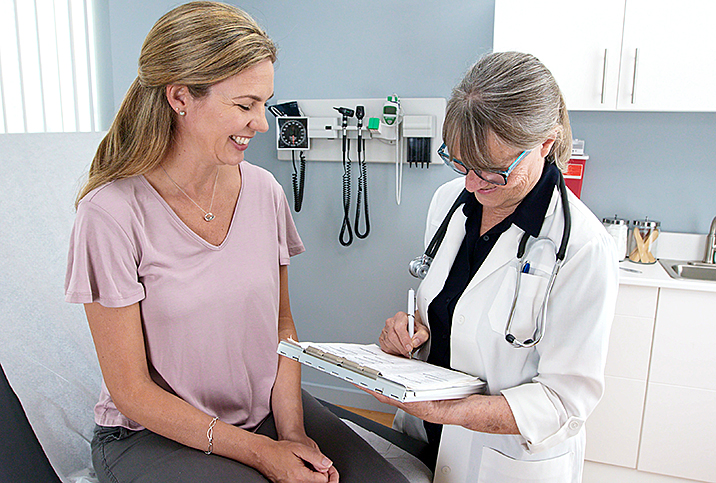What to Expect When You See the Gynecologist for the First Time

Gennette, 32, first visited the gynecologist in the seventh grade when she had a period that lasted 28 days. The Washington-based communications consultant recalled feeling uneasy with her male gynecologist, who happened to be her classmate's stepdad.
Even without a personal connection, it can be intimidating to discuss sensitive health issues with a gynecologist. Having a stranger examine your vagina can be especially unnerving if you've experienced sexual trauma.
Despite initial reservations, seeing a gynecologist is an opportunity to take control of your sexual and reproductive health. A gynecologist answers questions about birth control, menstruation, STIs, acne and weight gain, among other things. Every time we do something for the first time it can be unnerving, so here are some tips for a person's first gynecologist visit.
When should you start seeing a gynecologist?
Some patients come in for the first Pap test and general exam when they become sexually active.
"Although it doesn't necessarily have to be because some people don't become active," said Elisabet Joa, M.D., F.R.C.P.S., a clinical professor of obstetrics and gynecology at The University of British Columbia. "If they're having gynecological issues, sometimes they'll come to see us at quite a young age. Sometimes we'll even see babies."
Lola, a 32-year-old Uruguayan-American freelance journalist, first saw a gynecologist at age 20, five years after becoming sexually active. She learned her ex-boyfriend had been in a previous relationship with someone who tested positive for human papillomavirus (HPV) and had been diagnosed with cervical cancer. Her gynecologist confirmed she had HPV and told her she was likely to have cervical cancer and die.
"I felt horrible about myself because I didn't know much about STIs," Lola said. "I was really concerned that I had this infection that I could pass along to other women, and they could potentially die because of me."
Shortly after, Lola visited a different gynecologist who performed a biopsy. The results indicated she had precancerous cells.
"The doctor told me it's every person with a uterus' responsibility to go to the gynecologist once a year, and it's my responsibility to use protection, be mindful and communicate with my partner," Lola said.
What will the doctor ask?
The gynecologist will begin with a thorough medical history including questions about allergies, medications, menstruation issues, drug and alcohol use, and family history of cancer. To help inform treatment options, the doctor may ask about birth control, history of sexual activity and exposure to STIs.
"The important thing to realize is that you are in complete control of your body and how this visit goes," said Apurva Shah, M.D., an obstetrician-gynecologist and member of the Mira Medical Advisory Board. "Feel free to speak up and convey how you feel at all times."
The goal of the first visit is to get to know you and your needs.
What happens during the exam?
Your gynecologist will perform a routine physical exam, which consists of taking your blood pressure, listening to your heart and performing an abdominal exam. If there aren't any overt issues, the doctor may suggest you have a pelvic exam.
Comfort is key. If you're not ready, you can defer the exam until your next appointment.
"Unless there are concerns like irregular bleeding or pelvic pain, an external genital exam is all that may be needed at the first visit," Shah explained. "Not every person needs a pelvic exam."
During a pelvic exam, the doctor will have you lie on your back with your feet in stirrups so they can examine your external anatomy. Next, the doctor will use a device called a speculum, which allows them to see inside the vagina and look for any issues that affect intercourse or the use of tampons and diva cups. The speculum comes in different sizes, including a pediatric speculum, which can make the exam more comfortable.
"The cervix is what we want to make sure is normal because sometimes they can have undiagnosed issues in the vagina where they may have a septum or something that's developed a little bit differently," Joa explained.
Next, the doctor will perform a Pap smear, or Pap test, where they collect cells from the cervix to screen for cervical cancer. After removing the speculum, the doctor will put one or two fingers inside your vagina to make sure everything feels normal.
What happens after the exam?
Your gynecologist will go over their findings with you. If the Pap test reveals any abnormalities or precancers, the doctor will call you back to discuss treatment or further testing, such as an ultrasound to get a closer look at the ovaries.
"Allow the doctor to diagnose you before you tell them what you think you have," Lola added. "Of course, if they suggest one thing and you think it might be something else, you should bring that up."
If your Pap test is normal, the doctor may suggest you return once a year for checkups and once every three years for cancer screening.
"Prevention is always better than cure," Shah emphasized. "Annual exams function to uncover any issues that may not be readily apparent."
How can you make the visit more comfortable?
You don't have to shave or wax.
"There's no expectations as to grooming," Joa said. "Sometimes patients think there are expectations and it's funny because it doesn't matter."
You don't have to do this alone. You can bring someone with you to the appointment or request a chaperone be present for exams.
"Irrespective of the gender of your provider, medical chaperones promote a general sense of safety and comfort," Shah noted.
After the appointment, you can debrief with a family doctor or another service provider.
If you have concerns about the actions of your gynecologist, you can report them to the American College of Physicians. When you meet with a new gynecologist, it helps to let them know about your previous experience.
"It just makes the provider a bit more sensitive to the situation," Joa explained.
You can defer or decline any exam that makes you uncomfortable—it's your right as a patient. In hindsight, both Gennette and Lola wished they had felt more empowered to push back on information they believed was inaccurate.
"Trust your intuition about your body," Gennette said. "We are our own strongest advocates."


















